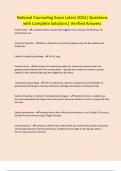(value priorities) an implicit preference for one value over another in a particular
value assumption
context
conclusion= reason + value assumptions
a reasoning trick that an author might use while trying to persuade you to accept a
fallacy
conclusion; error of reasoning
an attack, or an insult, on the person, rather than directly addressing the person's
ad hominem
reasons
making the assumption that a proposed step will set off an uncontrollable chain of
slippery slope
undesirable events, when procedures exist to prevent such chain of events
falsely assuming that because part of a problem would remain after a solution is tried,
searching for perfect solution
the solution should not be adopted
a key word is used with two or more meanings in an argument such that the argument
equivocation
fails to make sense once the shifts in meaning are recognized
an attempt to justify a claim by appealing to sentiments that large groups of people
appeal to popularity
have in common; falsely assumes that anything favored by a large group is desirable
supporting a conclusion by citing an authority who lacks special expertise on the issue
appeal to questionable authority
at hand
the use of emotionally charged language to distract readers and listeners form relevant
appeal to emotion
reasons and evidence
distorting an opponent's point of view so that it is easy to attack; thus attacking a point
straw person
of view that does not truly exist
false dilemma assuming only two alternatives when there are more than two
making the faulty assumption that because we wish X were true or false, then X is
wishful thinking
indeed true or false
falsely assuming that because you have provided a name for some event or behavior
explaining by naming
that you have also adequately explained the event
the use of vague emotionally appealing virtue words that dispose us to approve
glittering generality
something without closely examining the reasons
an irrelevant topic is presented to divert attention from the original issue and help to
red herring
win an argument by shifting attention away from the argument and to another issue
begging the question an argument to which the conclusion is assumed in the reasoning
texas sharpshooter jumping to the conclusion that a cluster in some data must be the result of a cause
value assumption
context
conclusion= reason + value assumptions
a reasoning trick that an author might use while trying to persuade you to accept a
fallacy
conclusion; error of reasoning
an attack, or an insult, on the person, rather than directly addressing the person's
ad hominem
reasons
making the assumption that a proposed step will set off an uncontrollable chain of
slippery slope
undesirable events, when procedures exist to prevent such chain of events
falsely assuming that because part of a problem would remain after a solution is tried,
searching for perfect solution
the solution should not be adopted
a key word is used with two or more meanings in an argument such that the argument
equivocation
fails to make sense once the shifts in meaning are recognized
an attempt to justify a claim by appealing to sentiments that large groups of people
appeal to popularity
have in common; falsely assumes that anything favored by a large group is desirable
supporting a conclusion by citing an authority who lacks special expertise on the issue
appeal to questionable authority
at hand
the use of emotionally charged language to distract readers and listeners form relevant
appeal to emotion
reasons and evidence
distorting an opponent's point of view so that it is easy to attack; thus attacking a point
straw person
of view that does not truly exist
false dilemma assuming only two alternatives when there are more than two
making the faulty assumption that because we wish X were true or false, then X is
wishful thinking
indeed true or false
falsely assuming that because you have provided a name for some event or behavior
explaining by naming
that you have also adequately explained the event
the use of vague emotionally appealing virtue words that dispose us to approve
glittering generality
something without closely examining the reasons
an irrelevant topic is presented to divert attention from the original issue and help to
red herring
win an argument by shifting attention away from the argument and to another issue
begging the question an argument to which the conclusion is assumed in the reasoning
texas sharpshooter jumping to the conclusion that a cluster in some data must be the result of a cause










